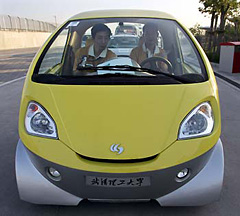 |
 |
 |
 Editorials | Environmental | June 2007 Editorials | Environmental | June 2007  
No Green Boom in Hybrid Cars in Mexico
 Jeremy Schwartz - Statesman.com Jeremy Schwartz - Statesman.com
go to original


| | Despite push by city government, cost and culture make hybrid cars hard to find in smoggy Mexico City. |
Mexico City — With its choking cloud of haze and hellish traffic jams, Mexico City, a megalopolis of 20 million people, would seem a natural fit for cleaner running hybrid cars.

But as environmentally friendly hybrids gain popularity in the United States — surpassing 143,000 in sales in the first five months of this year — green-vehicle advocates are running into a tougher market south of the border.

In 2006, the first year that hybrids were commercially available in Mexico, only 485 left showroom floors. And of the 4 million cars and trucks slogging through the Mexican capital, fewer than 100 are hybrids, local officials said.

Mayor Marcelo Ebrard is hoping to change car consumer culture in Mexico City, which prefers bulkier sport-utility vehicles to hybrids.

Despite the daunting numbers, officials in and around Mexico City are optimistic that hybrids will make up 10 percent of the vehicles in the city in a decade, helping to cut emissions in one of the world's most polluted cities.

"The problem is not that the technology doesn't exist," Ebrard said in a recent speech. "But rather that we have habits and ways of viewing reality in which we assume that the next generation will pay our environmental costs."

City officials, with help from a $200 million environmental grant from the Clinton Foundation, organized by former President Clinton, have developed a pilot program to stimulate hybrid purchases by city employees. Qualifying employees see their down payments and interest waived. So far, however, there are no plans to extend the program to the public.

Instead, Ebrard offers hybrid buyers a combination of limited tax breaks and relief from the city's emissions verification program. But that might not be enough to overcome a widespread wariness of the cars or their price. At about $27,000, new hybrids are out of reach for the majority of Mexicans.

"These cars are ideal for Mexico City, but the problem is the cost," said Humberto Bravo, an expert on airborne pollution at Mexico's Autonomous University. "They can't compete with the cheaper gas vehicles."

With an electric engine that kicks in during stop-and-go traffic, hybrids could significantly cut pollution in Mexico City's air, advocates say. Last year, the city had 218 high ozone days, compared with 322 in 1997.

As bad as Mexico City's air is, it has improved greatly since 1992, when the United Nations called the city the most polluted in the world and officials famously compared breathing the air to smoking two packs of cigarettes a day. Since then, catalytic converters and unleaded gas have cleaned the air: The volcanoes that ring the 7,000-foot-high city are occasionally visible.

Even though Mexico City has some of the world's worst traffic — one recent study found the average daytime speed to be 12 mph on freeways — residents are smitten with large SUVs. They accounted for 23 percent of new vehicle purchases last year, according to the Mexican Automobile Industry Association.

Residents of Mexico City bought 43,915 SUVs last year compared with 48 Honda Civic hybrids, the only hybrid currently available.

"The truth is that many people think they are what they drive," said Tania Mijares of the Mexican Center for Environmental Rights. "And so the bigger, the more ostentatious the vehicle, the better they feel."

Karina Robles, a Mexico City lawyer and mother of four, said the hybrid doesn't fit her lifestyle.

"It's great that they contribute to the environment, but it doesn't accommodate my needs," said Robles, who drives a Nissan X-Trail SUV. "It's not big enough to fit my kids, my friends, my suitcases."

Cesar Flores, president of the Mexican Automobile Industry Association, said hybrids won't become a big seller until Mexico undergoes a fundamental shift in philosophy, similar to the one happening in the United States.

"We still don't have that environmental culture," he said.

Flores said the government could spur hybrid purchases by slashing high sales taxes on new cars. Currently, the Mexico City government has reduced only the yearly tax Mexicans pay on their hybrids, which could save buyers as much as $400 annually. The U.S. government offers tax credits from $650 to $3,150.

Environmental groups warn that even if hybrids become the rage in Mexico City, the high sulfur levels in Mexican gasoline could limit the benefits. In 2003, gasoline levels of sulfur, which causes higher emissions, were 10 times greater in Mexico than in the United States, according to some estimates.

Cesar Reyna de la Madrid, technical secretary of the Metropolitan Environmental Commission in Mexico City, said that by 2009, all gas sold in Mexico should have sulfur levels near those in the United States. | 
 | |
 |



